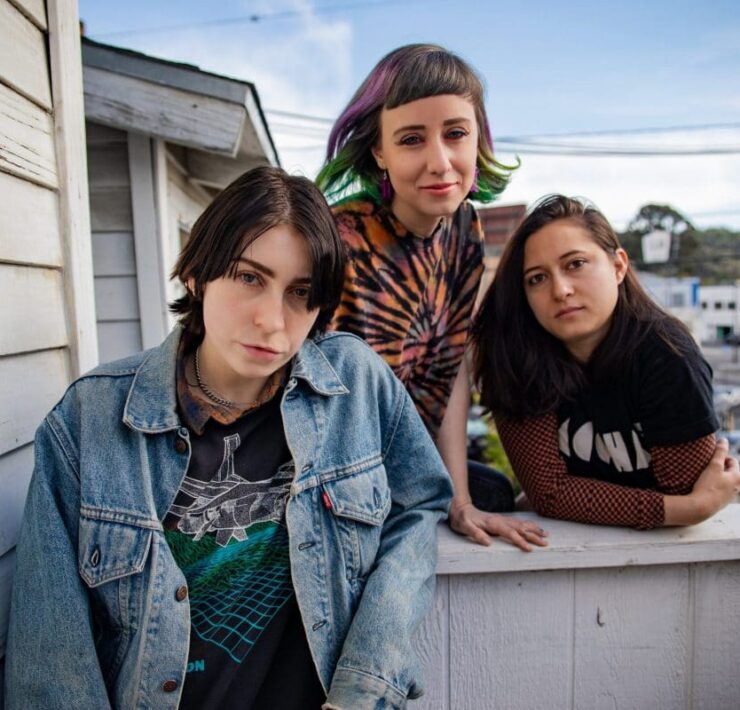How one Denver Band are Handling Remote Music Production

Sundays have always been important for TúLips. Since forming back in 2018, the self-described “feminista, genre-non-conforming, BIQTPOC” band collective have come together at the beginning of each week to practice, write music and lyrics, and generally share space and community with one another. With social distancing guidelines in place due to the outbreak of COVID-19, TúLips, like many bands, have shifted their approach to creating music, reaching audiences, and even reaching one another.
“At the very beginning, my biggest grief was really around our space as a band, like how we would come together for practice” said vocalist and multi-instrumentalist Celesté Martinez. “I was looking forward to the cool things [shows] we had coming up and beginning to imagine what those would look like. Now, it’s about reimagining those things and continuing to imagine how we can still make music and connection.”
According to vocalist and songwriter Vic Gómez Betancouet, the group originally had plans to record an EP to be released at a PrideFest show. However, with some tweaks to their recording process, the artists continue to work on it today. Like many musicians practicing social distancing, TúLips turned to Soundtrap to collaborate with one another. The cloud-based app is complete with more than 4,000 preset beats, loops, and instruments, allowing musicians to collaborate with one another anywhere in the world. For the members of TúLips, the hardest part of remote collaboration is recording individually.
“It’s really a puzzle to jump into a track and piece it together across distances,” said multi-instrumentalist Stevie Gunter, who brings previous Soundtrap experience to the group. “The recording setup is different, so you have to be really strategic.”
Related article: Queer, Trans, and Colorful in Boulder
Martinez says this pandemic made her realize how much she relies on being with the group, both in the recording process but also in how she approaches their music. “Us recording individually is so different than when I’m together with them as a group,” she explained. “There’s one song that Vic sings lead on, and I have never learned the lyrics to that song. I didn’t realize how much I lean on vocal queues.”
Martinez goes on to say that once she fully learned how to sing the song, the next obstacle was harnessing the energy to perform on the track. “I didn’t feel like I could bring that spirit by myself at first,” she said. “I had to sing it until I could imagine I was singing at a performance, even though it’s just me in my living room with all my instruments. It’s going to be a process.”
Finding the energy to create and perform is something each member of TúLips struggles with right now. Although the band does their best to collaborate while social distancing—even going as far as ensuring contactless delivery of freshly sanitized mics and mic stands and equipment—the musicians are still struggling with the full switch to an “online-only” mentality.
“I struggled a lot going into this because I feed so much from our music and this band,” said drummer Lu Zamora. “In general, my digital life is something that doesn’t feel tangible to me, so it’s hard for me to feel the same kinds of urgency or presence all through digital means. The digital work doesn’t call to me the way that my chosen family and ‘famigos’ hype me up. It’s just not there.”
In an effort to find the energy and enthusiasm to make music as a group, the TúLips members have used this time in quarantine to hone in on their own creative processes. For Gómez Betancourt, that involves lots of painting, though she admits to feeling the anxiety weighing on her in terms of creativity and music at large.
Related article: How Not to Appropriate Black and Brown Queer Music
Gunter has taken a step back from juggling school, working multiple jobs, and TúLips and is now acting as the sound engineer on Soundtrap for the up-and-coming TúLips EP. Zamora finds joy in rollerskating, and Martinez is delving into her guitar skills and leaning into her role as the group’s social media coordinator. From streaming live sets at home to lifting the voices of other QTPOC bands, TúLips are getting loud online.
“We are really active on social media, so people can go see us on a regular basis to hear our music,” Martinez said. “We have always been very vocal about social justice issues, and we are constantly finding ways to engage in relevant things through our postings. Sometimes, we’re supporting a cause or taking a stand about companies that are profiting from our pain and our death at this point, and other times, we’re keeping it light. Either way, we’re using social media as a tool to reach QTPOC across the country as a way to connect through our voices and our music.”
This is not the ideal way to produce or consume music, but TúLips are leading by example in the social distancing games. During this uncertain time, musicians can look to them as leaders in the local music industry for ways to engage with audiences and among each other. For now, the group will continue to meet on Sunday afternoons, sharing community, making music with one another, and trying their best to adjust to the times.
Hear TúLips on Facebook at Facebook.com/TúLipsDenver or Instagram @tulips_denver.
What's Your Reaction?
Lauren is a marketing and social media coordinator for a Denver nonprofit. In her spare time she enjoys writing feature articles for Out Front, as well as blogging about breaking news and local and national LGBT happenings.









